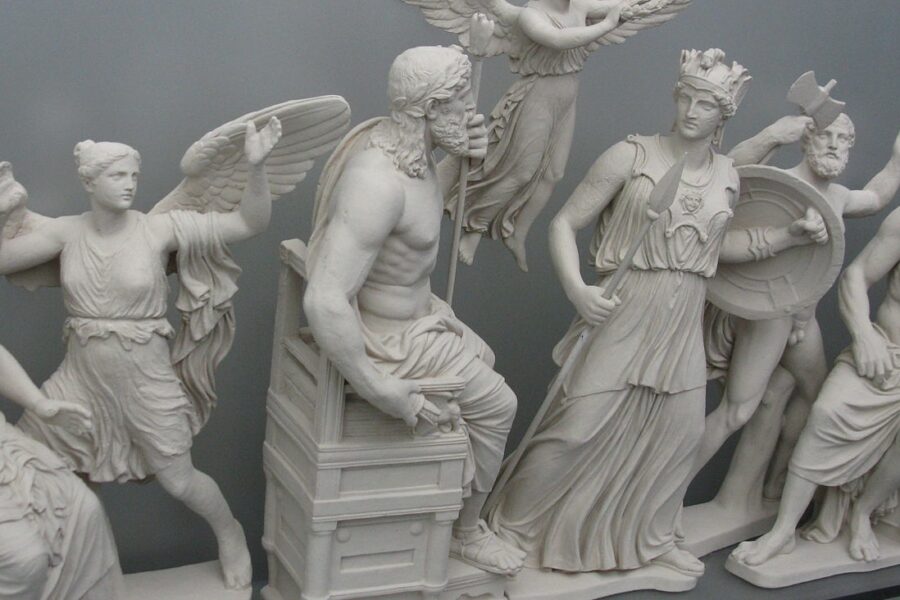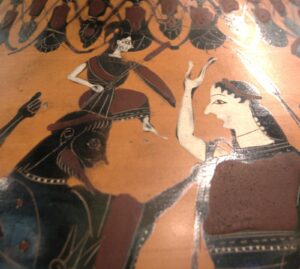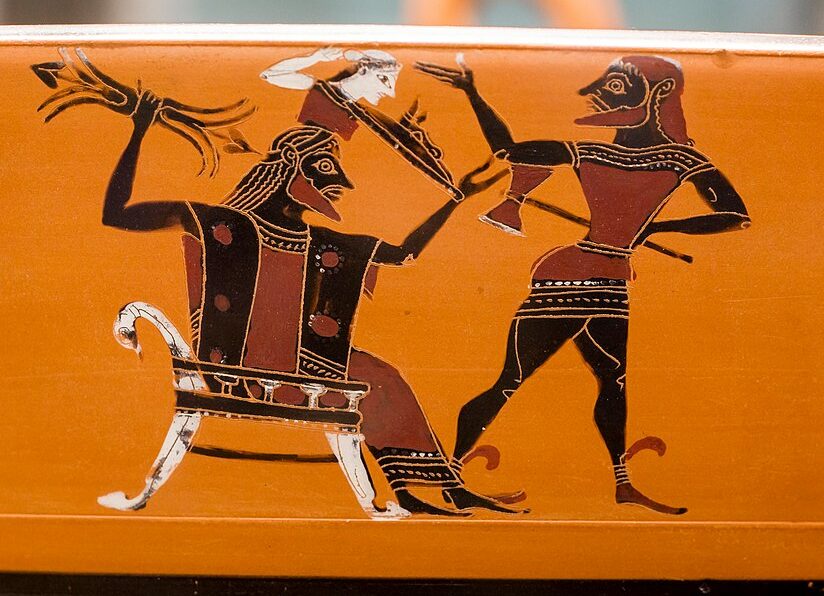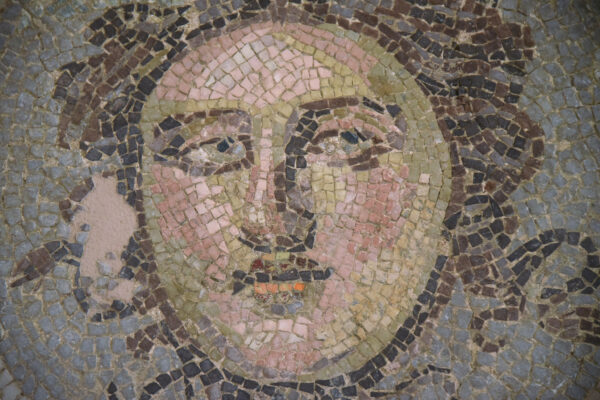
Athena’s birthday party took a turn when Zeus finally explained why her mother couldn’t make it.
Meeting 6: In which Homer demonstrates that he does not understand women, weaving, or the basics of where babies come from.
This episode of Mythology Pitch Meetings brought to you by CLAS-C 101 Ancient Greek Civilization.
Have you ever wondered how your favorite Classical Myths came to be? This is absolutely not how that happened, but it could have happened, maybe, and that’s the point of mythology. Shout-out to Ryan George, whose Pitch Meeting video series inspired the Muses.
CALLIOPE, MUSE OF EPIC POETRY: So you have a Classical Myth to pitch to me?
HOMER, UNCONTESTED G.O.A.T OF ANCIENT POETRY: Do I! But not a love story.
CALLIOPE: Good. Your last attempt at romance was terrible. You’re almost as bad as your friend Hesiod.
HOMER: This story is about the birth of Athena. Sort of birth. She pops out of her dad’s head!
CALLIOPE: Um, it sounds like you don’t understand what happens after the romance part, either. So far this myth sounds too stupid for words.
CLIO, MUSE OF HISTORY (interrupting): Well I don’t know about words, but it will leave quite the visual record. It will be the main decoration of the Parthenon! And appear on hundreds of decorated pots!

Huzzah!
CALLIOPE: I guess I’ll hear this out then, although I’m really having trouble visualizing this where it doesn’t look ridiculous.
HOMER: So, back at the beginning of the world, Zeus has been giving special hugs to Metis, the Titan goddess of Thinking. But then, twist, Zeus hears a prophecy that the child born of Metis will overthrow the father. Which really worries Zeus, because that sort of usurpation thing runs in his family.
CALLIOPE: Prequel?
HOMER: Big time prequel. So Zeus decides he’s gotta do something, and he hatches a cunning plan. One day when he and Metis are…um…hugging again, Zeus proposes a game where they see who can turn into the smallest animal.
CALLIOPE: Is that a game the Olympian gods play regularly?
HOMER: Not really, but I need an activity that ends with Zeus swallowing Metis.
CALLIOPE: I beg your pardon?
HOMER: The two of them turn into various animals, until finally Metis turns into a fly and Zeus swallows her. But because she’s a goddess, she doesn’t die, she just stays inside Zeus for all time, and that’s why he’s so wise.
CALLIOPE: I didn’t predict that “he’s so wise” was coming at the end of the part where Zeus eats his baby-momma like an aspirin.
HOMER: Then, one day soon, Zeus gets this super headache, and he realizes Metis has given birth within his head, and the child is trying to get out!
CALLIOPE: Wow, it’s going to be impossible for him to give birth through his skull!
HOMER: Actually, it’s going to be super easy, barely an inconvenience. Hephaestus, the god of the forge, grabs an axe and splits Zeus’s head open like a coconut, and out jumps the new goddess Athena, fully clothed and armed!

Hephaestus’s daring mini-skirt-and-axe combo was still overshadowed by Zeus’s armored-daughter-as-hat ensemble.
CALLIOPE: Where did she get the clothes?
HOMER: Um, she wove them. In his skull. Because she is the goddess of weaving.
CALLIOPE: What about the armor and weapons? You just said Hephaestus is the god of the forge, so she couldn’t have forged them.
HOMER: Um, she wove them too.
CALLIOPE: Now I’m beginning to worry you don’t know how weaving works.
CLIO: Come to think of it, you do have that weird weaving thing in The Odyssey, where it takes the suitors three years to figure out that Penelope has been undoing her weaving at night, and that’s why she’s needed such an unbelievable amount of time to weave a shroud. I always thought you were commenting on the suitors’ conceptual distance from Penelope, but now I think you might just be an idiot.
HOMER: The bigger point is that because Athena technically was born out of Zeus’ head, not out of Metis, the prophecy is null and void! Athena becomes her father’s best friend, since she popped out of his head and all, and Zeus continues his rule, unchallenged. The end.
CALLIOPE: I’m not sure that argument about the prophecy would hold up in court. But the whole thing sounds exciting and unique enough to work. It’s not like there’s going to be another story where Zeus gives birth to his own child.
HOMER: Oh no, of course not, can you imagine? (hides notes for “Birth of Dionysus” behind his back)
Share on Instagram, or really wherever you want.
To explore how the ancient Athenians tied their identity and architecture to weird birth stories (sequel!), enroll in CLAS-C 101 Ancient Greek Civilization, coming up Fall 2025, and earn GEC credits while you’re at it! Or for more adventures with Homer, Penelope, and significant if incoherent weaving, try our 1-credit “appetizer” course CLAS-B 313 Extraordinary Ancient Women, coming up Spring 2025 with no pre-reqs! Can’t get enough of Ancient Greece and Rome? Earn a Classics Minor in just 15 credits!


